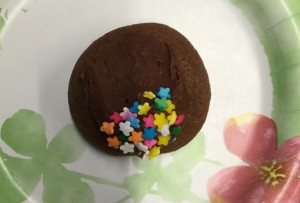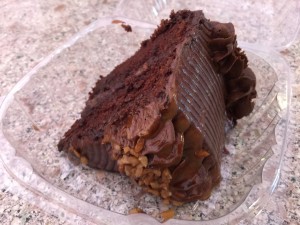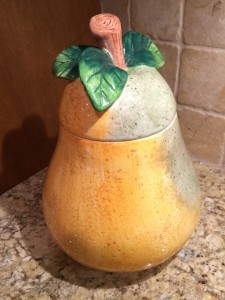One tough cookie is not a piece of cake, but clearing and cleaning your cookies can be a piece of cake and save your cache.
Cookies are small, roundish scrumptious treats. Here is a cookie I recently encountered and found quite tasty.
Cookies are often soft, sometimes crispy, sometimes frosted and sometimes candy-topped. A cookie is not tough. A tough cookie is not a cookie. Here is an example of a “tough cookie.”
Please note that this is a picture of a person, not a baked treat. This is a picture of a person who can endure physical and mental hardship and survive. This is a tough person. In this case, this person is a pirate from a wonderful book I recommend you read. We do not know why, how or when such a rough and rowdy person was first called a “tough cookie.” We do know our pirate in no way resembles a cookie, and we do know our pirate is certainly tough — so tough that dealing with such a pirate would not be a piece of cake.
Here is a picture that was a fresh, delicious, delectable and approachable piece of cake.
A piece of cake is very easy to deal with. You take the fork and proceed to deal. Hmmmmm! That was good. That was a piece of cake. “Piece of cake” is an idiom, as “tough cookie” was above. An idiom is a group of words having a meaning not deducible (a Sherlock Holmes’ word) from the individual words themselves. “Piece of cake” is an idiom used to describe not a real piece of cake, but rather a situation that is easy and requires little effort. As I put down my fork, I think, That was quite a good idiom and required little effort to reduce.
On the other hand, a pirate is one tough cookie and not at all a piece of cake.
There are “cookies” of a different kind than pirates and tasty treats. I speak of your computer and our browsing on the Internet. When you visit a web site to consider a purchase of something, say a pair of shoes, the site remembers the pair you liked. When you leave without purchasing those shoes, that site might deposit a packet of coded information on your computer and in your browser that contains the memory of those shoes you did not buy. The bits and bytes of that encoded shoe data are the “cookie” left behind in your computer.
In the Internet realm, a “cookie” is the packet of remembered information stored on one computing machine by another computing machine.
At a future time, when you return to the shoe site, that computer grabs a quick look at the old cookie left behind on your computer. Before you can say “Shazam!” up pops a picture of the pair of shoes from your prior visit, along with a few other similar and suggested footwears that seem to fit your style. “How did it know to do that?” you ask. “Cookies” is the answer.
Here is a picture of pair of shoes that could be a cookie on your computer – it was on mine and it was on my granddaughter’s feet at a recent feat and festivity.
Now, we turn to an even trickier thing. Now, we turn to your computer’s cache.
In common parlance, a “cache” (pronounced “cash”) is a collection of valuable things stored in an inaccessible location. Remember Scrooge McDuck and his big Money Bin full of gold. That bin or vault was Mr. McDuck’s cache.
In computereeze, a “cache” is a very similar thing. Computer cache is data stored on your computer (often without your knowledge) to speed up the retrieval of information when you return to a location on the wide Internet. Remember those shoes above. Cookies are often cached (hidden in inaccessible locations) to speed up future activities.
To illustrate, here is cache of cookies hidden from the grandkids but readily accessible on their next visit.
The problem with your cookie cache is that it may contain valuable treasure in the form of personal and private information. Because of this, there are tough cookies out there on the Internet who will stage hit-attacks (h-acks) to steal your cookies. Pirates will load their cannons and blast viruses and malwares to breach your computer’s domain. This is why you have firewalls, scans, clearings and cleanings to prevent and repel the hacks of pirates attacking your island to steal your treasure.
Don’t forget the clearings.
Often, the best defense is a good offense.
This is important: Clear the cache to clean the cookies.
Go on the Internet and figure out how to do this for your computer.
Then, clear your cache and clean your cookies. Do this regularly — as recommended for your machine. After learning the first time, this will be a piece of cake and the best defense against those tough cookies out there cruising the virtual seas for an easy hack. Don’t do this and one tough cookie may end up with your cache.
Happy Cache Clearing, To You
Until We Meet Again
Happy Cookie Cleaning To You
Keep Smilin’ Until Then
Grandpa Jim





